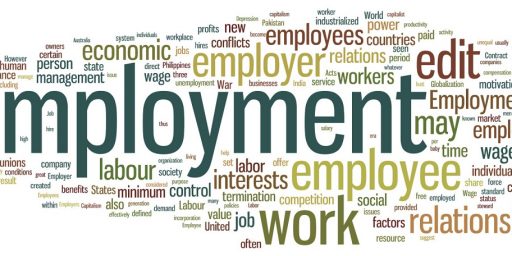The High Cost Of Authoritarianism
We spend so much time fighting over who should be in power that we don't get anything important done.

Some of the academic research on authoritarian regimes focuses on rent-seeking, the ability of autocrats and their cronies to corruptly manipulate the levers of power to increase their own wealth without creating any new wealth. The other high price of authoritarianism is the inability of politics to address urgent needs. The current, unprecedented battle over the 2020 presidential election results has consumed so much of our attention that we’re not able to attend to other matters. Like the pandemic. Or this pandemic-related story that would otherwise be a national scandal:
A wrongful death lawsuit tied to COVID-19 infections in a Waterloo pork processing plant alleges that during the initial stages of the pandemic, Tyson Foods ordered employees to report for work while supervisors privately wagered money on the number of workers who would be sickened by the deadly virus.
Normally, we would be discussing the best way to drop the legal and regulatory hammer on these managers. We might be having a useful debate over the utility of the current level and type of regulation of food companies and protections for workers in this industry.
Instead, the headlines are dominated by Trump invited Michigan lawmakers to the White House, the GSA head’s future job prospects, the President-elect’s workarounds for there not being a transition process, Trump’s level of psychological denial, and other matters that should not be a consideration at all, if we didn’t have a lazy, wannabe autocrat in the White House, and an anti-democratic party in control of the Senate. (You can call complicity in undermining an election “a lack of leadership,” a tactical measure to win Georgia’s two Senate seats, or fear of a highly energized “base.” People support authoritarianism for all kinds of reasons. It’s the support for authoritarianism, not the motives, that matter.)
This is why we have democracy and the rule of law. We have elections in which different voices are heard, but we all respect the collective results of the election. We follow the laws both in letter and spirit that ensure a smooth exchange of leaders. We let governing continue.
Instead, authoritarianism injects monumental levels of distraction. People fight to stay in power. Other people fight to remove them. Meanwhile, important matters fall by the wayside. Authoritarianism isn’t an efficient mechanism for getting the trains to run on time. It’s just the seizure and preservation of power by people who don’t really care about the other people not like them, and often not about the people who even support them. It’s the preservation of power, not its perfection.






Unfortunately, authoritarians and their enablers don’t care about the high cost of authoritarianism:
Authoritarian and totalitarian nations also tend to do things badly, when they manage to get them done at all. See collectivization of agriculture in the USSR and China, the Great Leap “Forward,” WWII, Mexico’s lost decade(s), Rome’s many misadventures in the frontiers, etc.
I have already resolved to find a new use for 3 hours a day when Trump is finally forced out and some semblance of representative democracy is projected by at least the Executive Branch. I haven’t decided on woodworking or learning a foreign language, but I hope to have it mastered by the end of March.
It’s an unremarked aspect of lack of local democracy: it promotes corruption/capture of the (nominally) centralised bureaucracy by local interest groups; or by the bureaucracy itself.
The “efficient” Party-managed state of China is often lauded; but in reality those who do not have a favoured relationship with the Party/government power structure stand no chance in legal cases or land rights or pollution damage etc etc against those who do.
See also: Putin’s Russia: to thrive, you must have a “roof”, a patron, within the power structures, who you pay off. And “ordinary” people know that nobody in their right mind crosses the “connected”.
See also: the ineffective nature of English local government under “Old Corruption” before the Victorian reforms when most post were patronage of the landowning elite or of town “corporations”.
All entail massive costs in terms of diverted money, of inefficiency, rent-seeking, health and environmental damage, etc.
@JohnSF:
Where have I heard of a system like that before? Can’t remember. Starts with an “M”.
@gVOR08:
Mafia?
Mafia (and e.g. entrenched drug cartels) is sort of a mirror-image of it; an anti-state version, which some think ironically originated in part in the attempts of Sicilians to counter the exploitatation power duopoly of the aristocracy and the monarchy.
The Russian Mafiya/Bratva/Vory/Siloviki are even more corrosive because there is no state system or judicial apparatus that even attempts to stand against them or counterbalance them.
(In Italy the criminal fraternities have learnt that pushing the state too hard or openly can be a very risky thing)
China is a bit different; it does not resort to naked force so readily, and the central state requires certain levels of effectiveness, order and discretion.
And “Old England” was moderated by legal systems and competing elite groups that were not easily ignored. The system was characterised more by neglect than by extortion, and was low on mechanisms for much enforcement of any sort, good or bad.
Even without the dime-store authoritarianism this would be difficult as there is a significant number of people in this country who don’t even believe that COVID-19 is a real thing…though the phrase was coined back in 2006, it is more salient now than ever that reality has a well-known liberal bias…
@drj: Uhh… yeah. To put it bluntly, the system is broken and at least one set of stakeholders values the broken state of the system more than it does whatever benefits might accrue from fixing the system if fixing that system requires that set of stakeholders to relinquish power to any degree whatsoever.
This is why I tell libertarians that there are only two choices: government or warlords, take your pick.
(I guess there’s anarchy, but there’s a reason why everyone flees such areas if they can. No developed economy has ever worked under it.)